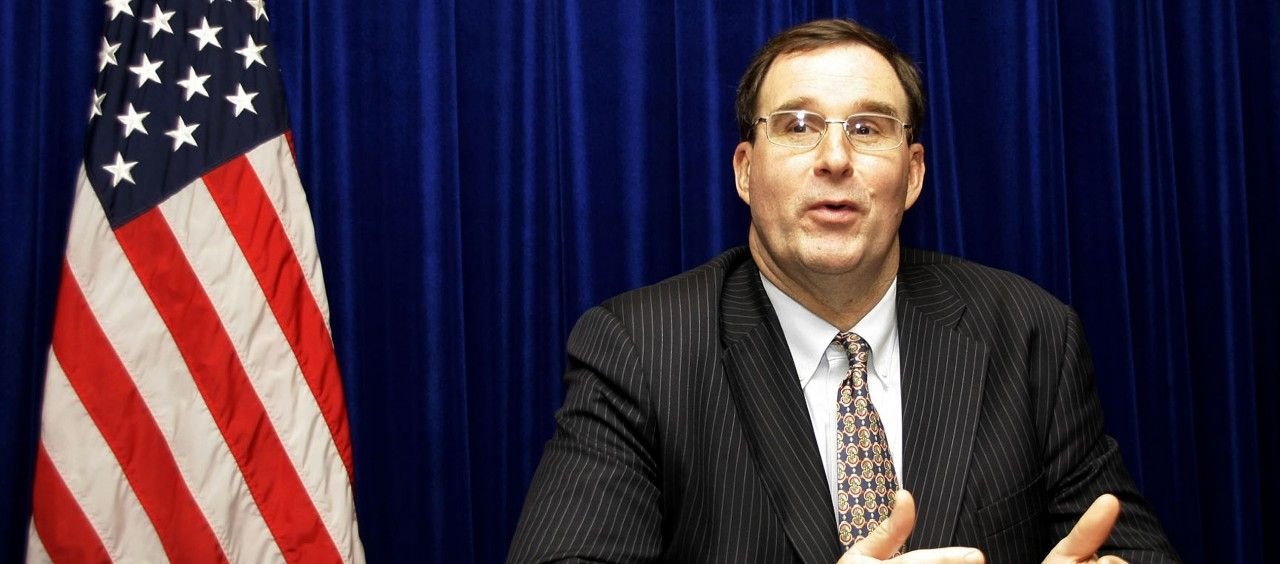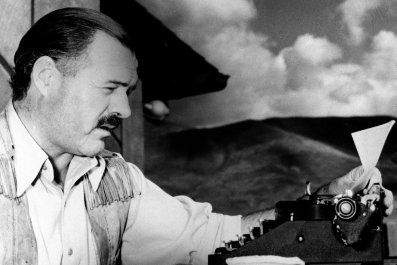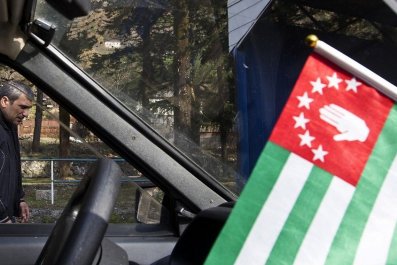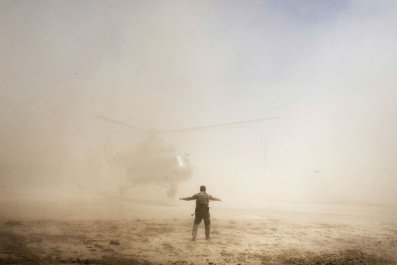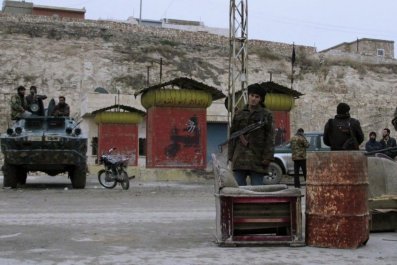In Washington, D.C., they say, your enemies stab you in the back, your friends stab you in the chest. So it was earlier this week, with ex-Defense Secretary Robert Gates's lacerating portrait of President Obama's White House's politics-driven national security team in a memoir entitled Duty: Memoirs of a Secretary at War.
And now the Pentagon's former top expert on Afghanistan is charging that the most recent gloomy intelligence report on the future of that nation was cooked up and leaked by administration officials trying to lay the groundwork for a quicker exit from the war there.
If true, that would be a new twist in the funhouse world of Washington leaks. Usually, when anonymous officials leak a secret report saying a U.S. military campaign is on the verge of disaster, it's designed to spur support for more troops, planes, time and money.
But David S. Sedney, a veteran senior national security official who headed the Pentagon's office for Afghanistan, Pakistan and Central Asia until resigning in May, says the recent leak of a National Intelligence Estimate (NIE) on Afghanistan was tailored to jibe with polls that show two out of three Americans think the war is not worth fighting. And it is polls, he says, that drive foreign policy decisions by the president's closest aides.
Instead of making a case for staying the course, Sedney says, the NIE, details of which were leaked to The Washington Post and Los Angeles Times in late December, was designed to prove that nothing can be done to save Afghanistan from the Taliban. "I know enough about the NIE processing and what went into it that when I read the leak - and it has been confirmed to my satisfaction since then - that this was a leak by people in the White House who support the zero option" - a near complete withdrawal of U.S. military forces from Afghanistan, Sedney said in an interview with Newsweek.
"Where the president comes down is not clear," added Sedney, a widely respected official who has been involved in Afghanistan since U.S. forces routed the Taliban in 2002, including twice serving as deputy chief of the U.S. embassy there. But whoever leaked the report, he said, undoubtedly hoped to influence Obama in advance of his State of the Union address, just a few weeks off, in which the president is expected to address his options in Afghanistan.
"One person told me it was the quickest leak of an NIE in their recollection," Sedney said. "Like all leaks, it was a leak with a purpose."
Accusations that NIEs, officially a collaborative effort of all 16 intelligence agencies but heavily influenced by the Defense Intelligence Agency and CIA, are cooked to order are common and troubling. One of the most notorious came in 2003, when then-CIA director George Tenet caved to pressure from the George W. Bush White House to "find" that Iraq possessed weapons of mass destruction - a finding that turned out to be groundless. Other legendary battles have been fought over NIEs on Iran's nuclear program, the numbers of Soviet missiles and, going back 50 years, the strength of communist forces in South Vietnam.
This NIE on Afghanistan, which "officials familiar with the report" described to the Post, predicted a dim future for the country, even with high levels of U.S. economic and military aid. "The gains the United States and its allies have made during the past three years are likely to have been significantly eroded by 2017, even if Washington leaves behind a few thousand troops and continues bankrolling the impoverished nation," it says, according to the Post.
Sedney declined to guess the source of the leak, but in his memoir, Gates singles out Vice President Biden for planting doubt in the president's mind about the troop surge in Afghanistan and "subjecting Obama to Chinese water torture" with daily comments about how the military can't be trusted.
Obama, Gates wrote, "doesn't believe in his own strategy" for Afghanistan "and doesn't consider the war to be his. For him, it's all about getting out."
The White House strongly rebutted Sedney's charges, deflected blame for the leak and argued that the NIE provides fodder for staying in Afghanistan.
"I'm not aware of anyone here at the White House providing details of this highly classified document to the press," National Security Council spokeswoman Caitlin Hayden told Newsweek. "The supposed reason for our doing so doesn't even make sense, and is out of touch with our policy. We've been very clear that a post-2014 future in which there would be no U.S. or NATO troop presence in Afghanistan is not what we want, and not in Afghanistan's interests."
But Hayden also hinted at the White House's frustration with Afghan President Hamid Karzai's refusal to sign an agreement regarding the future of U.S. troops there. "It is true that if we cannot conclude a bilateral security agreement promptly," she said, "then we have no choice but to begin planning accordingly."
In other words, to get out.
As if on cue, a cable to Obama from the American ambassador to Afghanistan, James B. Cunningham, saying that Karzai was not likely to sign the bilateral security agreement before the April elections surfaced in The Washington Post late Thursday.
Sedney, who visited Kabul two weeks ago, says the CIA has been shifting resources out of Afghanistan to accommodate Obama's "pivot" toward Asia, and U.S. foreign service officers and spies there are "sitting in the embassy," instead of traveling around the country getting firsthand looks at what's going on. This slowdown has left commanders and officials "reduced to, in many cases, relying on fragmentary signals intercepts" from the National Security Agency to track the insurgents.
Sedney said NSA eavesdropping is no substitute for CIA operatives, known as case officers, especially since enemy guerrillas have learned to leave their cell phones behind when infiltrating Kabul's green zone.
As a result, he added, the CIA has issued a string of "poorly done," overly negative intelligence assessments on Afghanistan's military and security services. What they're missing, he believes, is the massive influx of Afghans from the countryside to the cities since 2002, which has drained the Taliban's reservoir of potential recruits. Once they've seen the lights of the city, he said, they won't want to go back - especially to the Taliban's extremist Puritan ways.
The consensus that "because the Taliban control the countryside they control the majority of the people...is wrong," he declared.
In all this, Sedney is echoing the complaint General David Petraeus made when he became CIA director in 2011, prompting accusations that he was trying to infect intelligence reporting with a pro-military bias. And although Sedney, like Petraeus, has many fans, even some of his admirers think, as one put it, he "represents the outer extreme of DoD optimism about Afghanistan."
A senior CIA official, speaking on condition of anonymity, called Sedney, "badly misinformed... while I'm not going to comment on any particular classified intelligence assessment, we strongly dispute Mr. Sedney's characterizations of past CIA products."
But CNN national security analyst Peter Bergen, author of four books on Afghanistan, including The Longest War: The Enduring Conflict Between America and Al Qaeda, thinks Sedney has a valid point. "The sky-is-falling view" - expressed in the NIE - "is simply ahistorical," Bergen said. "The sky has fallen three times in the past in Afghanistan: The Soviet invasion, the ensuing civil war in the early 1990s and the rule of the Taliban in the second half of the 1990s.
"What is going on now is so much better than anything Afghanistan has experienced since 1979, and people tend to forget this fact."
Jeff Stein writes the weekly SpyTalk column for Newsweek from Washington.



